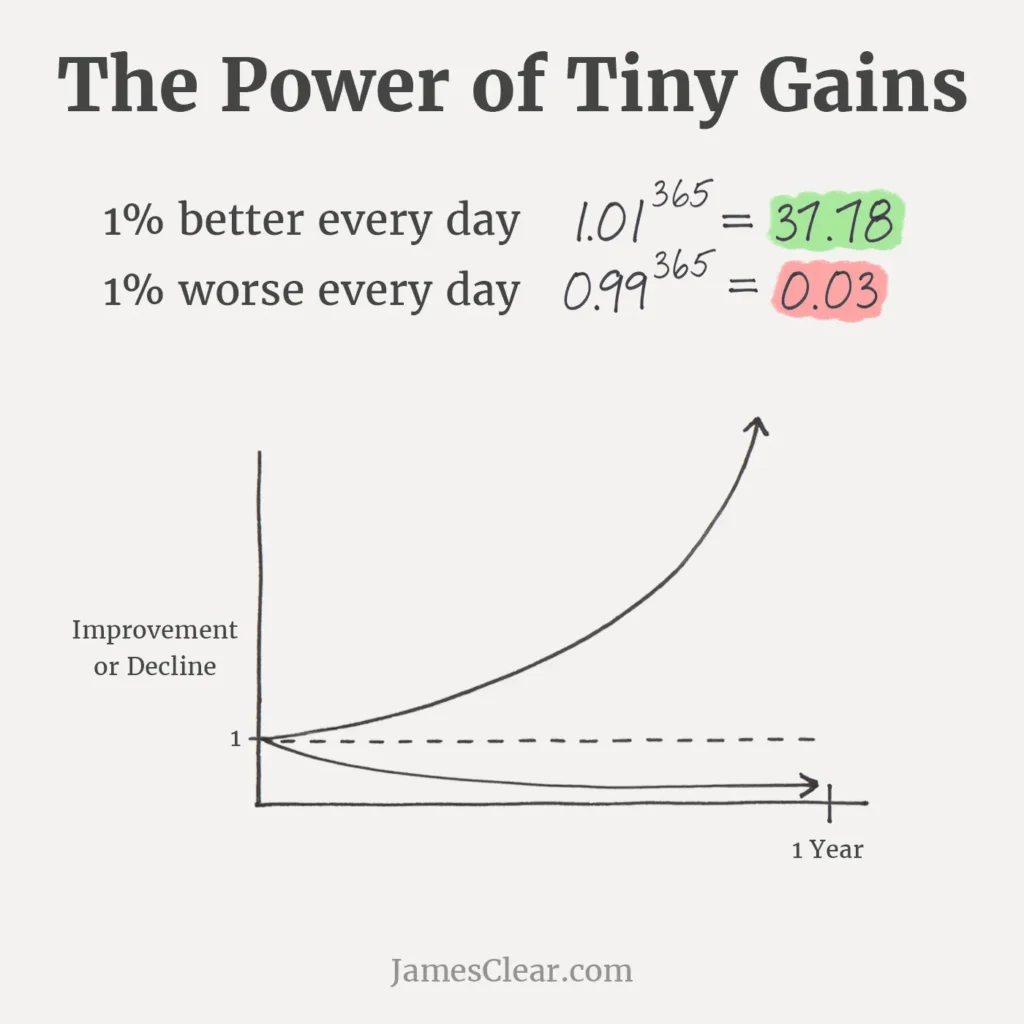For Shavuot in 2020, I taught a class about self-improvement and self-awareness. (You can watch it by clicking here.) In particular, I wanted to teach that subject to crystalize some of my own thoughts about the journey I was on. My own desire to become better than I was yesterday. To become more aware, conscientious, and intentional about my choices and thoughts.
I truly believe that one of the most important tasks we can take on each and every day is becoming more aware of ourselves.
I’m inspired by this image by James Clear. In it, we can see the compounding effect of improving oneself, even just a little bit.

It is with this mindset that I want to visit the story of Jacob wrestling with the Angel from this week’s Torah portion, Vayishlach.
Let us begin with some context. Jacob swindled his older brother out of his birthright and escapes with his life. He swindles his uncle and escapes with his life. Now, it is all coming to a head and now his brother, Esau, is coming with four hundred men, conceivably a small army, to face Jacob.
Jacob is terrified and develops a strategy to put all of his belongings and his family for Esau to encounter first. He’s buttering up his brother so Esau won’t kill him.
And then we’re told this (Genesis 32:24-25):
וַיִּקָּחֵ֔ם וַיַּֽעֲבִרֵ֖ם אֶת־הַנָּ֑חַל וַֽיַּעֲבֵ֖ר אֶת־אֲשֶׁר־לוֹ׃ וַיִּוָּתֵ֥ר יַעֲקֹ֖ב לְבַדּ֑וֹ וַיֵּאָבֵ֥ק אִישׁ֙ עִמּ֔וֹ עַ֖ד עֲל֥וֹת הַשָּֽׁחַר׃
After taking them [Jacob’s family] across the stream, he sent across all his possessions. Jacob was left alone. And a man wrestled with him until the break of dawn.
We can draw a few lessons from this:
Possessions can be a barrier to awareness.
I don’t think that having possessions is inherently problematic. Judaism has never really encouraged asceticism. At the same time, we can use our possessions as a marker of success or as a replacement for understanding ourselves.
Jacob, with his family and belongings separated from him, gives us a chance to see him more fully. He’s stripped of all of the external trappings. Perhaps, we’re seeing the “real Jacob.”
We are each on our own journey.
The Torah tells us that Jacob is alone. This would seem obvious! We were just told that he sent everyone and everything across the river. Why would the Torah make this explicit?
It is a reminder that we are each on our own journey, no one can do it for us. Of course, our lives intersect with others constantly, the pandemic notwithstanding. No one can make the hard decisions for us, make us grow up, become the best people we can be. Ultimately, we have to decide that for ourselves.
Wrestling is the path to growth.
If everything in life was easy and simple, life would be boring and meaningless. The conflict and struggle we each face is important. They help us become who we are. I’m often inspired by this Brené Brown quote (bolding mine):
Embracing our vulnerabilities is risky but not nearly as dangerous as giving up on love and belonging and joy—the experiences that make us the most vulnerable. Only when we are brave enough to explore the darkness will we discover the infinite power of our light.”
Jacob finds himself alone at night facing the darkness of his life’s choices. Now, let’s be clear, I’m reading this “man” as Jacob himself. That’s not the only reading, but the one that inspires me the most.

This brings us to the second half of this struggle (Genesis 32:26-30):
וַיַּ֗רְא כִּ֣י לֹ֤א יָכֹל֙ ל֔וֹ וַיִּגַּ֖ע בְּכַף־יְרֵכ֑וֹ וַתֵּ֙קַע֙ כַּף־יֶ֣רֶךְ יַעֲקֹ֔ב בְּהֵֽאָבְק֖וֹ עִמּֽוֹ׃ וַיֹּ֣אמֶר שַׁלְּחֵ֔נִי כִּ֥י עָלָ֖ה הַשָּׁ֑חַר וַיֹּ֙אמֶר֙ לֹ֣א אֲשַֽׁלֵּחֲךָ֔ כִּ֖י אִם־בֵּרַכְתָּֽנִי׃ וַיֹּ֥אמֶר אֵלָ֖יו מַה־שְּׁמֶ֑ךָ וַיֹּ֖אמֶר יַעֲקֹֽב׃ וַיֹּ֗אמֶר לֹ֤א יַעֲקֹב֙ יֵאָמֵ֥ר עוֹד֙ שִׁמְךָ֔ כִּ֖י אִם־יִשְׂרָאֵ֑ל כִּֽי־שָׂרִ֧יתָ עִם־אֱלֹהִ֛ים וְעִם־אֲנָשִׁ֖ים וַתּוּכָֽל׃
When he saw that he had not prevailed against him, he wrenched Jacob’s hip at its socket, so that the socket of his hip was strained as he wrestled with him. Then he said, “Let me go, for dawn is breaking.” But he answered, “I will not let you go, unless you bless me.” Said the other, “What is your name?” He replied, “Jacob.” Said he, “Your name shall no longer be Jacob, but Israel, for you have striven with beings divine and human, and have prevailed.”
Jacob, alone with his thoughts, separated from his family, fearing for his life, wrestles all night long.
Without a doubt, I have spent many nights like this. Thinking, rethinking, overthinking situations, imagining scenarios, and contemplating arguments. It doesn’t take that much to put myself in Jacob’s shoes here. So what do we learn?
Thinking alone is not enough.
Jacob wrestles all night but doesn’t prevail over the “man” (read: himself). For the challenges we each face, unique as they are to every single one of us, in the end, we have to act. We must decide and then follow through in order to grow and improve.
In the fantastic book, Peak: Secrets from the New Science of Expertise, I was struck by this line:
“Successful mental representations are inextricably tied to actions, not just thoughts”
Mental representations are the systems we build in our heads for understanding. I have no idea how my car really works, but my mechanic has a very thorough mental representation. Jacob cannot think his way out of his troubles. He’s going to have to decide how to move forward and face his brother.
Blessings are opportunities for awareness.
Jacob demands a blessing from the “man.” This could be seen as a strange response to wrestling all night, but it becomes clear when we understand what a blessing is and does.
Blessings are invitations to become aware and intentional. When we recite them before eating or acting, we take a moment to be grateful and align our intention. Right before I take a bite of food, I can take a moment to become aware of the earth’s capacity to grow food, the hard labor of farmers who grew it, the individuals who transported it to my store, and the many grocery store employees (who during the pandemic have been heroes) who have allowed this food to end up on my plate.
This act of awareness is what we call a blessing.
My name(s) reflect who I am in the moment.
We each use many names. There are the names our parents gave us, our friends, our colleagues, and teachers. There are also the names we give ourselves.
My Hebrew name is Yaakov, Jacob, and I’ve always been drawn to the character in the Torah. On some level, when I call myself Yaakov, I’m manifesting a different aspect of myself. When my parents, wife, or friends use my nicknames, I’m a different person each time.
Jacob becomes Israel, which translates to “wrestler with God” more literally than the explanation in the verse, which helps us understand the worldview shift that he experiences. He is the person who really wrestled with himself. He finally did the work.
Unfortunately, we don’t get this kind of clarity in our own lives.
It is worth it to work on ourselves.
This short vignette about Jacob finally facing himself is a powerful lesson for ourselves.
It is challenging to put ourselves into the situation to really do self-awareness work. But when we do, we can come out the other side with a deeper understanding of the world around us, our own actions, and who we want to be in the world.